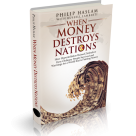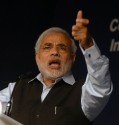
Economist Michael Hudson recently had plenty to say about the Panama Papers. He has a new book out called
Killing the Host which explains how US banks set up branches in Panama and Liberia - where income tax rates are zero - as a way to attract criminal drug money to the US rather than Switzerland. And how international corporations can book their earnings in Panama at zero tax, meanwhile the cash is safely stowed in a New York bank. Paul Craig Roberts looks at how Michael Hudson has deciphered the world of international finance, revealing a thinly disguised ruse of global proportions aimed at enriching the 1% at the expense of the 99%.
Read More »

Socialism proceeds afoot despite more than a century of evidence that it is a catastrophic failure. Those who belong to this church are motivated by selfish interests, ignorance, or immunity from evidence, argues Leon Louw. All the stated objectives of socialism - especially uplifting the poor - are better achieved by free market principles.
Read More »

Historian Johan Norberg recently explained in Johannesburg why the Swedish economic model will not work in SA. Sweden's wealth was not built on welfarism, but on a rigorous observance of free market principles.
Read More »

John Kane-Berman of the Institute of Race Relations offers some advice on how to get SA back on the rails again. First of all we need to figure out who runs the country: is it cabinet, President Zuma, the ratings agencies or the financial markets? Right now, it looks like no-one is in charge.
Read More »

If you want to stop being victimised by financial terrorists, stop using their currencies, says Charles Hugh-Smith. History is not on the side of the financial aristoracy who, like their Roman forbearers, are destined for wipe-out within the next 10 years.
Read More »

The visa debacle that drove an estimated 150,000 tourists away so far this year at a reported cost of R2,6 billion to the economy has finally been relaxed. Visitors applying to travel to SA will no longer have to submit biometric information in person at our embassies.
Read More »

Here's how free markets, given the slightest opportunities, eventually demolish cartels and monopolies. Whatsapp is about to launch a (nearly) free voice call service to its 700 million users worldwide, and mobile companies are fretting about how this will impact their futures.
Read More »

There is a percepitble mood of panic in SA, accentuated by power-downs, chaos in Parliament and a limping economy. Business is urning finance minister to break the curse of negativity in his upcoming budget speech, but the chances of this happening are slim to zero.
Read More »

President Jacob Zuma told the World Economic Forum in Davos last week that SA was a "country at work". Well, not quite. In fact, we compare miserably with other countries in sub-Saharan Africa and there is no real enthusiasm in government for reversing this trend.
Read More »

The minister of finance has called for suggestions from the public ahead of the 2015 Budget due out next month. Here's a few suggestions from a Cape-based businessman on how to get SA into double digit growth figures within six years.
Read More »

The tyranny of political correctness is hobbling this government, preventing it from doing what has to be done sooner or later: privatise not just parastatals but health care insurance and other areas of state incursion into the economy, writes Leon Louw of the Free Market Foundation.
Read More »

Given the recent tremors in world stock markets, future historians might regard the US dollar as an object of derision or a relic of some mad past. Either way, the world economy is headed for interesting times.
Read More »
 When Money Destroys Nations
When Money Destroys Nations is a new book by two Johannesburg-based economists. If you ever had the idea that what happened in Zimbabwe cannot happen here, you owe it to yourself to read this.
Read More »

India's new primine minister
Narendra Modi achieved economic miracles while running the state of Gujarat. Now his has the entire country under his stewardship. He could teach our own Jacob Zuma a thing or two about turning around a sinking ship, writes Leon Louw of the Free Market Foundation. Read More »

High Frequency Trading (HTF) is blamed for market crashes and has invited the attention of regulators who are programmed to strangle anything that moves. While Wall Street-bashing has become popular and - in some cases - deservedly so, there is a positive side to HTF argues Leon Louw.
Read More »

The US attorney general is investigating what many have long suspected - that the world's currency makets are manipulated by a group of financial insiders known as the "bandit's club."
Read More »

Only a fraction of the fishing licences applied for have been granted, leaving many well-established fishermen without a livelihood. The situation has been described as a "national disaster" by the Democratic Alliance, which wants the matter investigated.
Read More »

The Economic Freedom Fighters (EFF) founding manifesto is incoherent, contradictory and a recipe for war and famine. If even a part of this makes it into law, run for the hills. By Tom G Palmer.
Read More »

A silent revolution is taking place. When the regulatory over-burden becomes intolerable, people ignore those laws that inhibit their survival. The battle over e-tolling is an example of the silent revolution in action, and this is a battle government must win if it is to reclaim lost legitimacy, writes Ciaran Ryan
Read More »

The National Development Plan talks loftily of achieving growth of 5,4% a year, and 11 million jobs by 2030, but is in reality a recipe for state intervention on a scale not previously imagined.
Read More »

The government's National Development Plan is doomed to fail because it relies on the same, tired state interventions that have failed in the past, and does not address the urgent need for policy reform, according to the SA Institute of Race Relations.
Read More »
 Economist Michael Hudson recently had plenty to say about the Panama Papers. He has a new book out called Killing the Host which explains how US banks set up branches in Panama and Liberia - where income tax rates are zero - as a way to attract criminal drug money to the US rather than Switzerland. And how international corporations can book their earnings in Panama at zero tax, meanwhile the cash is safely stowed in a New York bank. Paul Craig Roberts looks at how Michael Hudson has deciphered the world of international finance, revealing a thinly disguised ruse of global proportions aimed at enriching the 1% at the expense of the 99%.
Economist Michael Hudson recently had plenty to say about the Panama Papers. He has a new book out called Killing the Host which explains how US banks set up branches in Panama and Liberia - where income tax rates are zero - as a way to attract criminal drug money to the US rather than Switzerland. And how international corporations can book their earnings in Panama at zero tax, meanwhile the cash is safely stowed in a New York bank. Paul Craig Roberts looks at how Michael Hudson has deciphered the world of international finance, revealing a thinly disguised ruse of global proportions aimed at enriching the 1% at the expense of the 99%. 

















 Historian Johan Norberg recently explained in Johannesburg why the Swedish economic model will not work in SA. Sweden's wealth was not built on welfarism, but on a rigorous observance of free market principles.
Historian Johan Norberg recently explained in Johannesburg why the Swedish economic model will not work in SA. Sweden's wealth was not built on welfarism, but on a rigorous observance of free market principles. John Kane-Berman of the Institute of Race Relations offers some advice on how to get SA back on the rails again. First of all we need to figure out who runs the country: is it cabinet, President Zuma, the ratings agencies or the financial markets? Right now, it looks like no-one is in charge.
John Kane-Berman of the Institute of Race Relations offers some advice on how to get SA back on the rails again. First of all we need to figure out who runs the country: is it cabinet, President Zuma, the ratings agencies or the financial markets? Right now, it looks like no-one is in charge.  If you want to stop being victimised by financial terrorists, stop using their currencies, says Charles Hugh-Smith. History is not on the side of the financial aristoracy who, like their Roman forbearers, are destined for wipe-out within the next 10 years.
If you want to stop being victimised by financial terrorists, stop using their currencies, says Charles Hugh-Smith. History is not on the side of the financial aristoracy who, like their Roman forbearers, are destined for wipe-out within the next 10 years.  The visa debacle that drove an estimated 150,000 tourists away so far this year at a reported cost of R2,6 billion to the economy has finally been relaxed. Visitors applying to travel to SA will no longer have to submit biometric information in person at our embassies.
The visa debacle that drove an estimated 150,000 tourists away so far this year at a reported cost of R2,6 billion to the economy has finally been relaxed. Visitors applying to travel to SA will no longer have to submit biometric information in person at our embassies.  Here's how free markets, given the slightest opportunities, eventually demolish cartels and monopolies. Whatsapp is about to launch a (nearly) free voice call service to its 700 million users worldwide, and mobile companies are fretting about how this will impact their futures.
Here's how free markets, given the slightest opportunities, eventually demolish cartels and monopolies. Whatsapp is about to launch a (nearly) free voice call service to its 700 million users worldwide, and mobile companies are fretting about how this will impact their futures. There is a percepitble mood of panic in SA, accentuated by power-downs, chaos in Parliament and a limping economy. Business is urning finance minister to break the curse of negativity in his upcoming budget speech, but the chances of this happening are slim to zero.
There is a percepitble mood of panic in SA, accentuated by power-downs, chaos in Parliament and a limping economy. Business is urning finance minister to break the curse of negativity in his upcoming budget speech, but the chances of this happening are slim to zero. President Jacob Zuma told the World Economic Forum in Davos last week that SA was a "country at work". Well, not quite. In fact, we compare miserably with other countries in sub-Saharan Africa and there is no real enthusiasm in government for reversing this trend.
President Jacob Zuma told the World Economic Forum in Davos last week that SA was a "country at work". Well, not quite. In fact, we compare miserably with other countries in sub-Saharan Africa and there is no real enthusiasm in government for reversing this trend. The minister of finance has called for suggestions from the public ahead of the 2015 Budget due out next month. Here's a few suggestions from a Cape-based businessman on how to get SA into double digit growth figures within six years.
The minister of finance has called for suggestions from the public ahead of the 2015 Budget due out next month. Here's a few suggestions from a Cape-based businessman on how to get SA into double digit growth figures within six years. The tyranny of political correctness is hobbling this government, preventing it from doing what has to be done sooner or later: privatise not just parastatals but health care insurance and other areas of state incursion into the economy, writes Leon Louw of the Free Market Foundation.
The tyranny of political correctness is hobbling this government, preventing it from doing what has to be done sooner or later: privatise not just parastatals but health care insurance and other areas of state incursion into the economy, writes Leon Louw of the Free Market Foundation.  Given the recent tremors in world stock markets, future historians might regard the US dollar as an object of derision or a relic of some mad past. Either way, the world economy is headed for interesting times.
Given the recent tremors in world stock markets, future historians might regard the US dollar as an object of derision or a relic of some mad past. Either way, the world economy is headed for interesting times. When Money Destroys Nations is a new book by two Johannesburg-based economists. If you ever had the idea that what happened in Zimbabwe cannot happen here, you owe it to yourself to read this.
When Money Destroys Nations is a new book by two Johannesburg-based economists. If you ever had the idea that what happened in Zimbabwe cannot happen here, you owe it to yourself to read this. India's new primine minister
India's new primine minister  High Frequency Trading (HTF) is blamed for market crashes and has invited the attention of regulators who are programmed to strangle anything that moves. While Wall Street-bashing has become popular and - in some cases - deservedly so, there is a positive side to HTF argues Leon Louw.
High Frequency Trading (HTF) is blamed for market crashes and has invited the attention of regulators who are programmed to strangle anything that moves. While Wall Street-bashing has become popular and - in some cases - deservedly so, there is a positive side to HTF argues Leon Louw.  The US attorney general is investigating what many have long suspected - that the world's currency makets are manipulated by a group of financial insiders known as the "bandit's club."
The US attorney general is investigating what many have long suspected - that the world's currency makets are manipulated by a group of financial insiders known as the "bandit's club." Only a fraction of the fishing licences applied for have been granted, leaving many well-established fishermen without a livelihood. The situation has been described as a "national disaster" by the Democratic Alliance, which wants the matter investigated.
Only a fraction of the fishing licences applied for have been granted, leaving many well-established fishermen without a livelihood. The situation has been described as a "national disaster" by the Democratic Alliance, which wants the matter investigated. The Economic Freedom Fighters (EFF) founding manifesto is incoherent, contradictory and a recipe for war and famine. If even a part of this makes it into law, run for the hills. By Tom G Palmer.
The Economic Freedom Fighters (EFF) founding manifesto is incoherent, contradictory and a recipe for war and famine. If even a part of this makes it into law, run for the hills. By Tom G Palmer. A silent revolution is taking place. When the regulatory over-burden becomes intolerable, people ignore those laws that inhibit their survival. The battle over e-tolling is an example of the silent revolution in action, and this is a battle government must win if it is to reclaim lost legitimacy, writes Ciaran Ryan
A silent revolution is taking place. When the regulatory over-burden becomes intolerable, people ignore those laws that inhibit their survival. The battle over e-tolling is an example of the silent revolution in action, and this is a battle government must win if it is to reclaim lost legitimacy, writes Ciaran Ryan The National Development Plan talks loftily of achieving growth of 5,4% a year, and 11 million jobs by 2030, but is in reality a recipe for state intervention on a scale not previously imagined.
The National Development Plan talks loftily of achieving growth of 5,4% a year, and 11 million jobs by 2030, but is in reality a recipe for state intervention on a scale not previously imagined. The government's National Development Plan is doomed to fail because it relies on the same, tired state interventions that have failed in the past, and does not address the urgent need for policy reform, according to the SA Institute of Race Relations.
The government's National Development Plan is doomed to fail because it relies on the same, tired state interventions that have failed in the past, and does not address the urgent need for policy reform, according to the SA Institute of Race Relations.